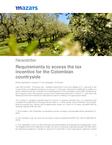
Requirements to access the tax incentive for the Colombian countryside
Law 1943 of 2018 - Financing Law - modified article 235-2 of the Tax Statute (E.T.), and with it, the income that is considered exempt as of January 1 of this year. Among the modifications made, it is worth mentioning the tax incentive for the development of the Colombian countryside introduced by the Financing Law in the second numeral of the mentioned article 235-2 of the E.T., with which the National Government intends to materialize the bet it is making in the agricultural sector.
The numeral in question provides that the income or revenues derived from an investment that increases the productivity of the agricultural sector or, in other words, of the Colombian countryside, shall be exempt from income and complementary taxes, for a term of 10 years, provided that the following requirements are met:
1. The investor in the Colombian countryside must be a company incorporated before December 31, 2021.
2. The company may not have annual gross income exceeding 80,000 UVT ($2,741,600,000 for 2019).
3. The corporation must: (a) have domicile and administrative and operational headquarters in the municipality where the investment is made; (b) have an exclusive corporate purpose that falls within the activities provided for in section A, division 01 of the ISIC in force (agriculture, livestock, hunting and related activities); (c) present its investment project to the Ministry of Agriculture and Rural Development, justifying its financial viability and economic convenience, to which the Ministry must indicate its conformity and confirm whether or not the investments increase the productivity of the agricultural sector; (d) have at least 10 workers who are linked to agricultural projects, and comply with the total payment of parafiscal contributions. It should be noted, for this last point, that the company's administrators, such as the manager, members of the board of directors, liquidators and others provided for in Law 222 of 1995, do not qualify as employees.
4. The investment must be equal or greater than 25,000 UVT ($856,756,000 for the year 2019) and must be made within a maximum period of 6 taxable years after the approval of the investment project by the Ministry of Agriculture and Rural Development.
It is important to highlight that the Draft Regulatory Decree of the exempt income benefit is currently published. This Draft Decree defines what must be understood by investors, administration and operation headquarters, activities that increase the productivity of the field, among others. Likewise, it establishes the procedure and the terms in which the investor must present and execute its investment project.
However, when reviewing the content of the Project, it is observed that, as regards the terms granted to access the benefit, it turns out to be restrictive in contrast with the provision it intends to regulate (Art. 235-2 of the E.T.). The above is evidenced when the Project in its article 1.2.1.1.22.2.7, provides that the term for the presentation of the investment projects before the Ministry of Agriculture and Rural Development, and the issuance of the initial act of conformity, will be until December 31, 2021.
This would imply that within such maximum legal term, the investment companies must not only be incorporated and in operation, as established in the second paragraph introduced by the Financing Law in Article 235-2 of the Tax Law, but the Draft Decree would be establishing that such companies, within the same term, must have filed their investment project before the Ministry of Agriculture and Rural Development, so as to ensure that the Ministry, before the maximum term established, has also issued the decision approving such project -even notified-.
On the other hand, the sole paragraph of Article 1.2.1.22.2.4. of the Project would limit the legal term for making the total amount of the investment by providing that not only must the investments be made within 6 years following the approval of the project, but also, within the same term, the administrative act approving them must be issued.
As a conclusion, as long as the Draft Decree is not final, investors still do not have the procedure and definitive terms to submit their investment project, which creates uncertainty regarding the opportunity to avail themselves of the exempt income benefit introduced by the Financing Law. In any case, if the Project is issued as it is currently drafted, it would mean that investors would depend on the efficiency of the public administration (Ministry of Agriculture and Rural Development) to comply with one or several of the legal requirements necessary to access the benefit, and if the required efficiency is not met, the incentive would not be more than an intention that could not be mastered.


